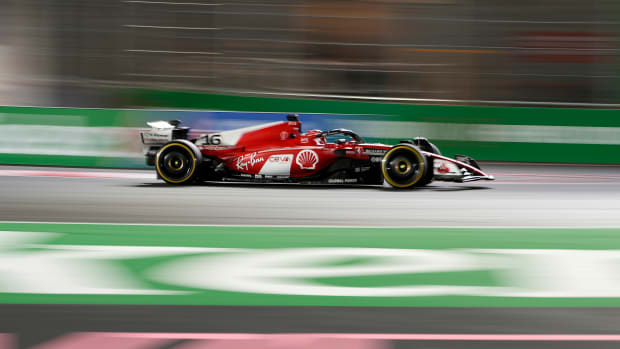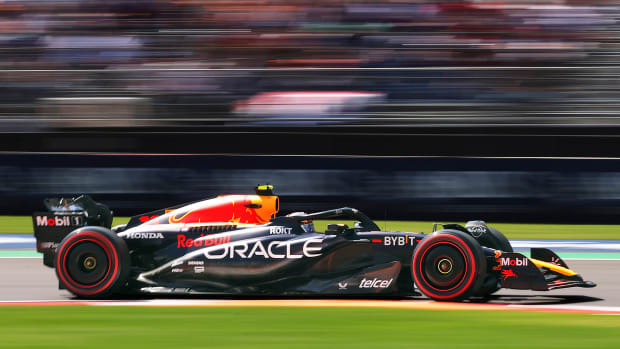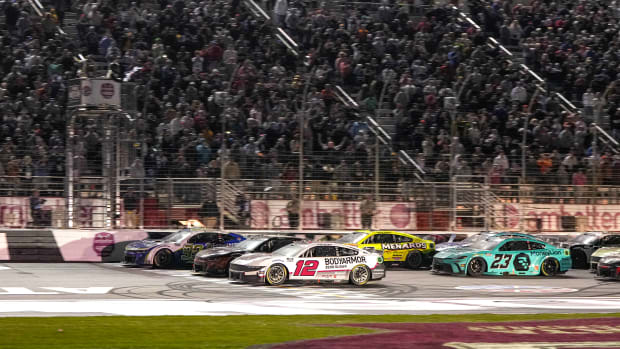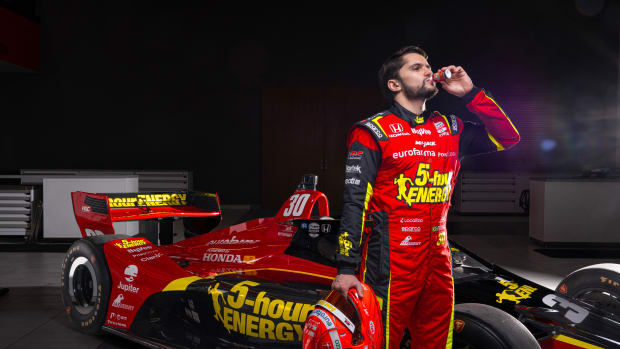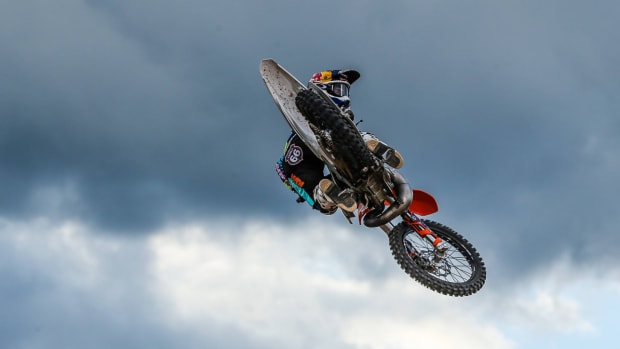Talking Daytona, Rolex 24 and more with NASCAR's Lesa France Kennedy
NEW YORK—She is the best kept secret in sports. That’s no mean feat in her famous family. Big Bill France, NASCAR’s founding father, is her granddad. Little Bill is her father. Brian, NASCAR’s chairman and CEO, is her kid brother. You would think that a sliver of the spotlight that those three have attracted would fall on Lesa France Kennedy. Yet she remains in the shadows.
“That’s not by design,” she says. “That’s not by design at all.”
It’s the nature of her work that keeps her virtually anonymous. Though she is listed as an executive vice president at NASCAR, she mostly minds International Speedway Corp.—the management company that controls 12 NASCAR tracks. That includes Daytona Speedway. This weekend, the track plays host to the Rolex 24—a 3.56-mile, day-long sports car race that attracts stars from stock cars (AJ Allmendinger, Jamie McMurray), open-wheel racing (Scott Dixon, Ryan Hunter-Reay) and the silver screen (Patrick Dempsey).
Amid the tire smoke there figures to be plenty of dust, as the track is in the midst of a $400 million renovation project—called Daytona Rising—that won’t be completed for another year. Competitors will have to mind the track. Before the green flag dropped (coverage begins Saturday at 2:10 p.m. EST on FOX), France stopped by the SI Now studios to talk about those projects and other racing matters.
SI.com: What inspired the Daytona renovation? It’s so iconic, after all.
France: I think the most important thing was to take it into the future. The track has served us well since 1959, but there really needed to be some modern amenities. We started from scratch. We're totally rebuilding the front stretch grandstand. We have a lot of very loyal fans and fans that have been with us for a long time. And we wanted to treat them to better amenities and guest services like escalators and elevators—things that you would see in a modern-day stadium. So we'll be the first true motorsports stadium.
Was this project at all driven by stadium envy—perhaps even among the newer tracks that have sprouted up on the NASCAR landscape?
France: Every time we build a new track, I think we also learn a little bit about what's really working and what the future is like. This will obviously be the most modern with all of the bistros and the areas—our neighborhoods, for instance, where people can interact socially, but they can also see all the on-track competition. They won't lose any of that if they take a break to go socialize with their friends.
And the TV screens, there'll be over 1,000. It'll really bring it up to state of the art with technology.
How much do live events compete with the at-home NASCAR experience?
France: I think the at-home experience with television has continued to improve, and it [puts us in competition for] our game with our live audience. I think that you do actually have to go to the race to experience the sights and the sounds. That’s what attracts people. My biggest challenge is getting people to their first race. I'm never challenged with getting people to their second race. Once they get there, they'll see everything—not just the race, but all the entertainment that goes on. As you know, it's a full-day experience. There's so much to do and see. That is hard to realize unless you're actually at the event.
What makes the Rolex 24 so special for you?
France: Well, the Rolex 24 has been growing and the exciting thing for us is the whole international audience that it draws. It kicks off our speed weeks, and you probably know it kicks off this weekend, our Rolex 24. That'll be the first time that people get a glimpse of the new Daytona Rising and where that's headed—our new project. We're real excited about it. But it is a different form of racing. With that international draw, we also have 10 manufacturers that participate in the Rolex 24, as well as drivers from Formula One, IndyCar drivers and NASCAR drivers. So there's a real broad spectrum. Jamie McMurray, who's a past Daytona 500 winner, will be competing this weekend. You really see a lot of people come together in the whole sports car event there.
Is the idea to keep them hooked through the Daytona 500?
France: I think there is some crossover. But I also think they're very unique experiences. I think that the Rolex 24 and the whole infield activity that you see and the festival atmosphere that it has is somewhat different from the Daytona 500 and our traditional NASCAR stock car racing. But there is some crossover. Motorsports fans in general, I think, tune into both.
About that NASCAR side, where do your passions lie?
France: I've been primarily on the business side. I am a fan, but I spend so much time on the business side of it. That's what I really, really enjoy. Like that a lot.
So you pretty much leave Brian to do his thing?
France: Brian really focuses on the competition and the research and development and the overall sponsorship and marketing of the sport. And I've spent most of my time on the track side.
Is that because of a brother-sister pact gone bad? Was he supposed to trade back with you at some point?
France: (laughs) We kind of did grow up that way [with Lesa liking the businesses side and Brian the competition]. Those were our interests and also where we landed. But we also serve on each other's boards. There is crossover obviously, since we're both under the same umbrella. We talk a lot. We spend a lot of time talking about the industry, but our day-to-day functions are somewhat separate.
What about the Chase? Did you follow it and, if so, how did you think it went?
France: I think the changes they made to the Chase were the best thing that they've done in at least a decade. I think you saw that through the TV viewership increase. Our last two races—at our tracks Phoenix and Homestead—were sold out way in advance. And we felt really good about that. The responses that we got from the fans were overwhelming, and the competitors loved it. Of course, Kevin Harvick loved it (laughs). And he's been very outspoken about his love for the new Chase format. I think that's working out well. I think as fans continue to learn about that whole format and they spend more time with it, their excitement will only grow. But people want to go and watch wins. They want to talk about winning. That's what makes stories, and that's where I think this new format's really ringing home.
Is it grating at all to see articles that evaluate racers based on how they would’ve done had the Chase not existed, or is that kind of debate just as fun for you guys as it is for the rest of us?
France: I think there's always going to be a what-if (laughs).
Jeff Gordon is probably one person who wishes things hadn’t changed. He might have eight Cup titles by now.
As Jeff Gordon prepares to retire from racing, he leaves a big seat to fill
France:
It certainly brought out a visceral intensity, the kind we tend to see in stick-and-ball sports.
France: When you get down to Homestead, and there are four potential winners of the entire championship, it's intense. You could just feel the intensity and the excitement. That's what our fans want to see. It was great. It was actually magical (laughs).
If anything cast a cloud over the finale, it was the specter of Kurt Busch’s domestic violence troubles. Have you been following the case much at all?
Truth lurks in bizarre fog of Kurt Busch's domestic violence hearings
France
Are you waiting on a resolution to the Delaware Family Court hearing, or a criminal finding?
France: I'm not immersed in the legal part of it.
How about what’s happening overall in NASCAR? It seems like the sport is in the early stages of a moment, especially with all the new blood coming into the sport. But is there enough momentum to get the sport back to its mid-2000s heyday?
France: If you look at the Daytona Rising project and what we're putting into that for the future of our sport, and you couple that with the changes that were made last year for the Chase, I think you're going to see that next surge. There's more excitement now than ever in NASCAR. I think this'll be the next growth spurt that you'll see in the future. There's been so much research and development and investment put into our future that I think it’s going to pay off well.
What does the R&D say about maybe knocking an hour off those races?
France: (laughs) Call my brother.


